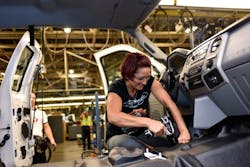Many manufacturers are missing a critical talent pool, which could aid in closing the skills gap – women. A study, "Women in Manufacturing: Stepping up to make an impact that matters," released on April 19 by The Manufacturing Institute, Deloitte and APICS, confirms the importance of increasing the amount of women in the manufacturing workforce.
Some key highlights from the study include:
Nearly three fourths (70%) of women indicate they would stay in manufacturing if they were to start their career today;
Some of the most important employment characteristics for women in manufacturing include opportunities for challenging and interesting assignments, attractive pay, and work-life balance; and
The most impactful programs to help retain women in manufacturing include formal and informal mentorship programs, flexible work practices, and increasing the visibility of key leaders who serve role models.
“Our research estimates that the cumulative manufacturing skills gap — or the positions that likely won’t be filled due to a lack of skilled workers — will grow to two million between 2015 and 2025,” said Craig Giffi, vice chairman, Deloitte LLP and U.S. automotive practice leader.
While there has been an overall positive change in the industry’s attitude toward women employees, women still make up 29% of the U.S. manufacturing workforce, while they make up approximately half of the total U.S. labor force.
In an effort to improve this, The Manufacturing Institute is promoting the role of women in manufacturing through mentoring, recognition, research, and leadership with the STEP Ahead initiative.
The study also examines the positive impact of STEP Ahead, reporting insights from former honorees and emerging leaders who indicate STEP Ahead has helped raise the visibility of opportunities for women in the industry, manufacturing opportunities in the community, and opportunities for women within their companies.
The STEP Ahead honorees and emerging leaders have reached an estimated 300,000 individuals – from peers in the industry to school age children – as a result of their active industry engagement.
Nearly 90% indicate they are engaged with individuals to raise the visibility of the industry;
92% are engaged in efforts in the development of women; and
70% are engaged with K-12 system to encourage young girls and boys to consider careers in manufacturing.
“The industry is missing out on a critical talent resource to help advance innovation in manufacturing, increase America’s competitiveness in the global manufacturing landscape and close the skills gap,” said Trina Huelsman, vice chairman, co-author of the research, Deloitte & Touche LLP.
“Unleashing the potential of women in manufacturing can reap big rewards." Hueslman added. "Organizations that make recruitment, retention and advancement of women a strategic priority can bring diverse decision making perspectives, drive innovative and creative solutions and can achieve overall better business performance.”
About the Author
IW Staff
Find contact information for the IndustryWeek staff: Contact IndustryWeek
